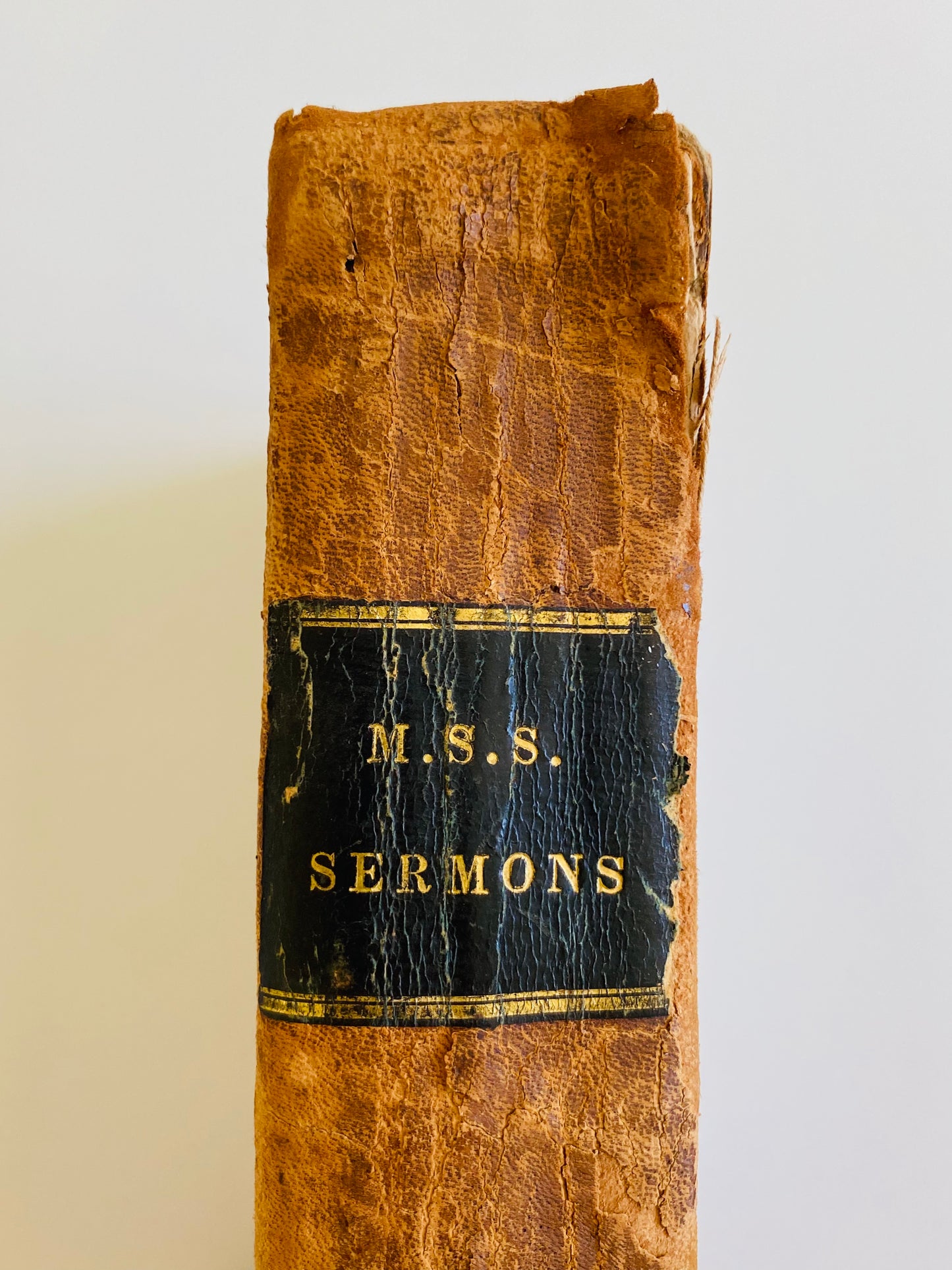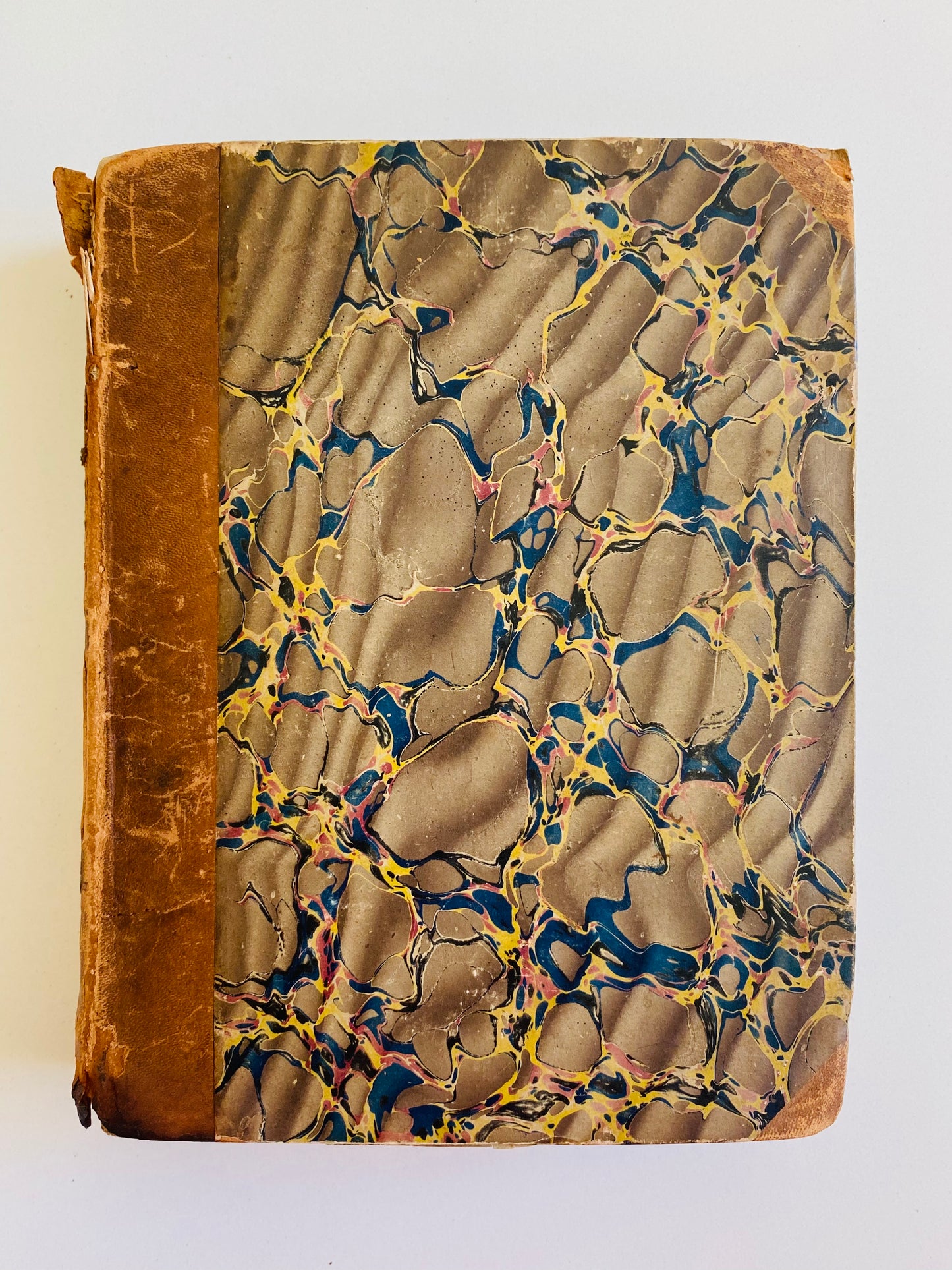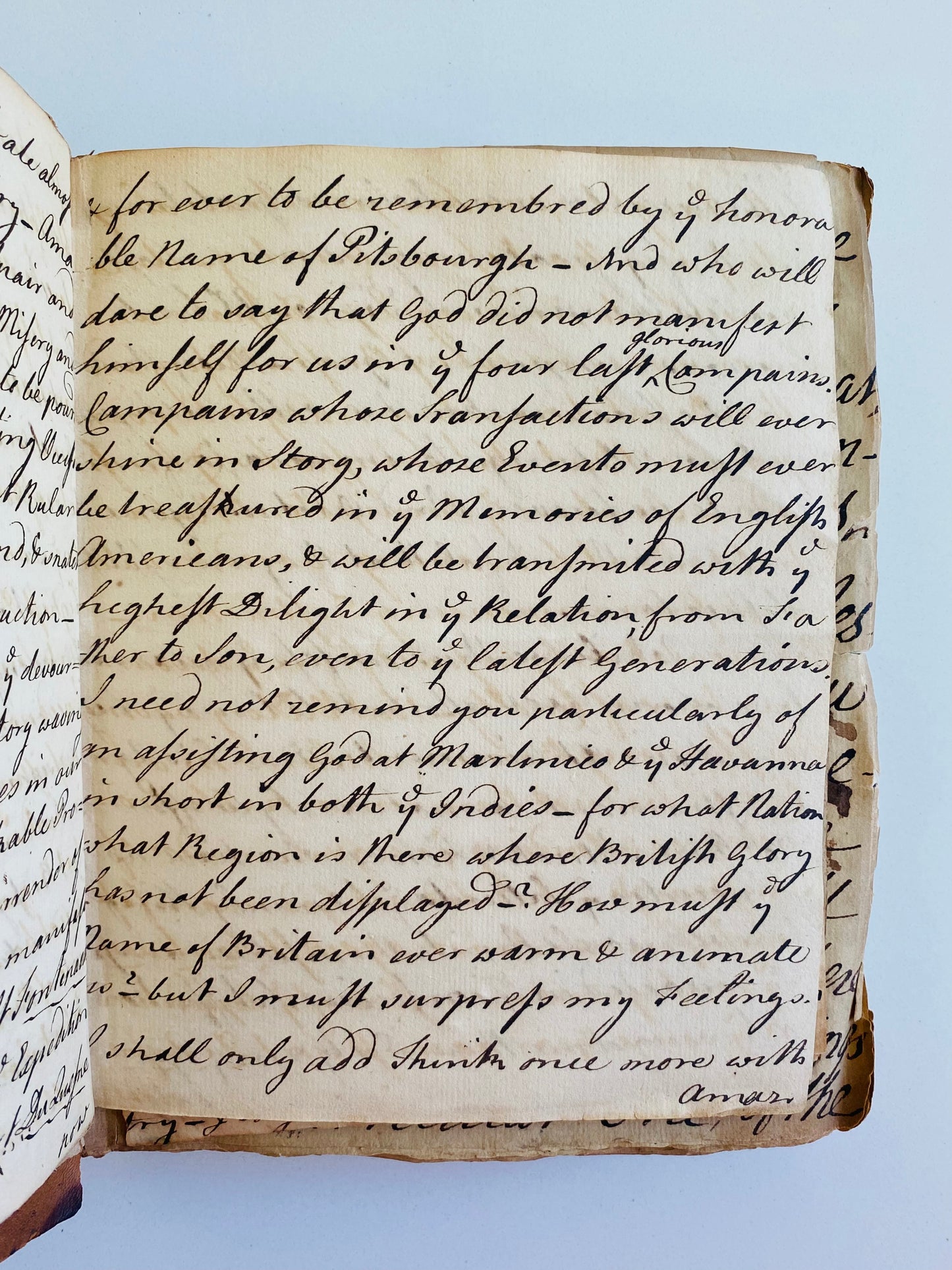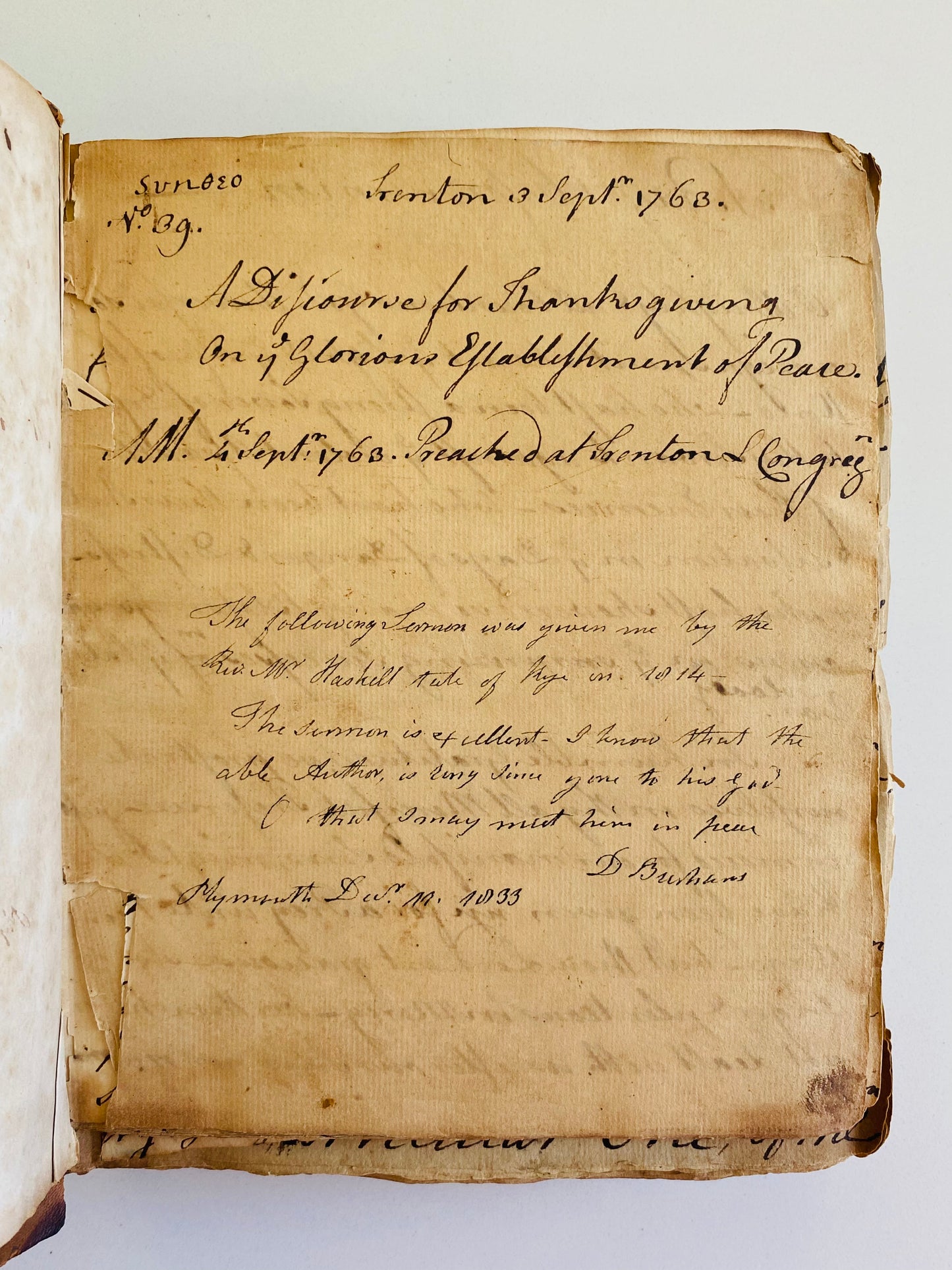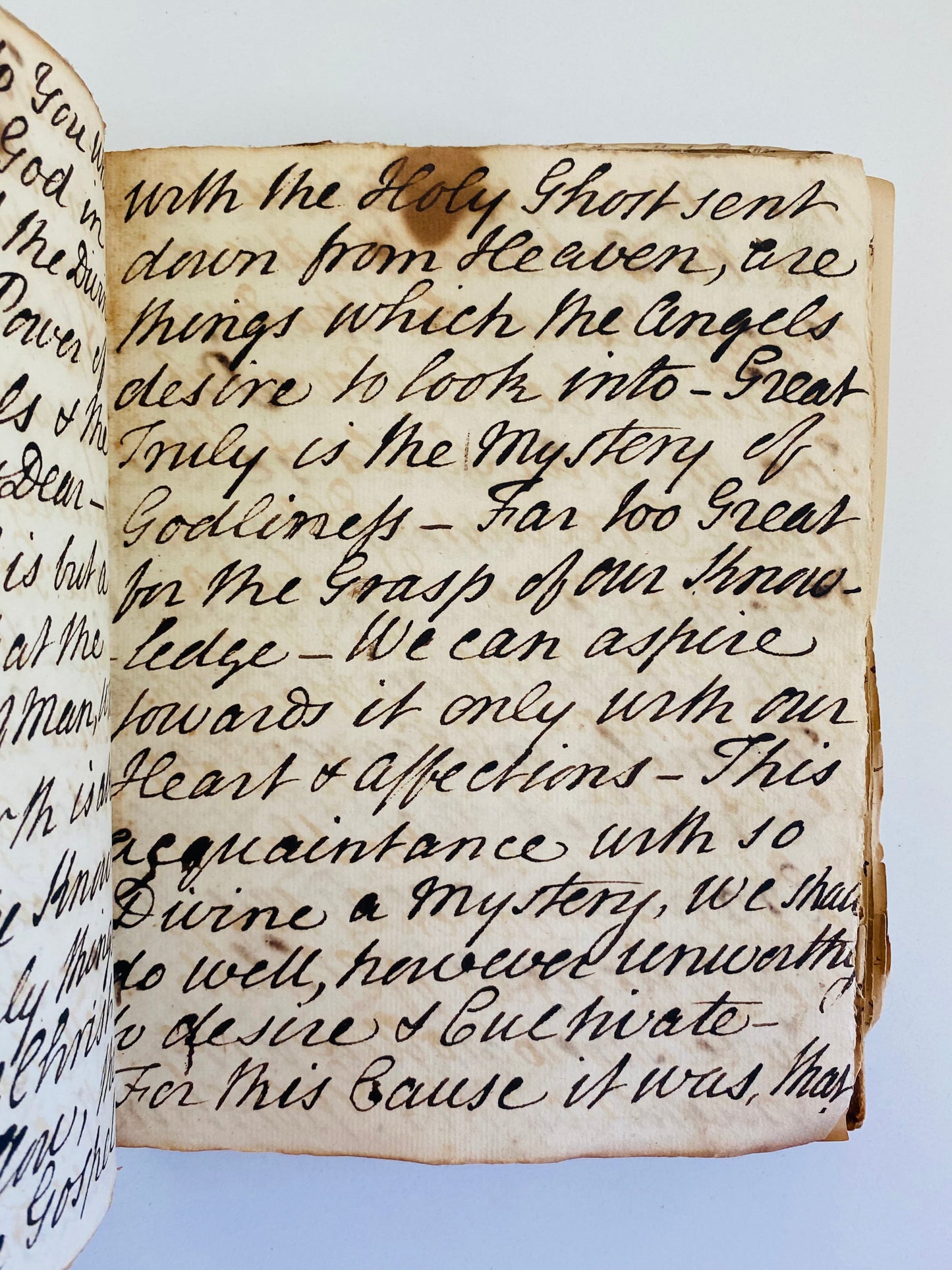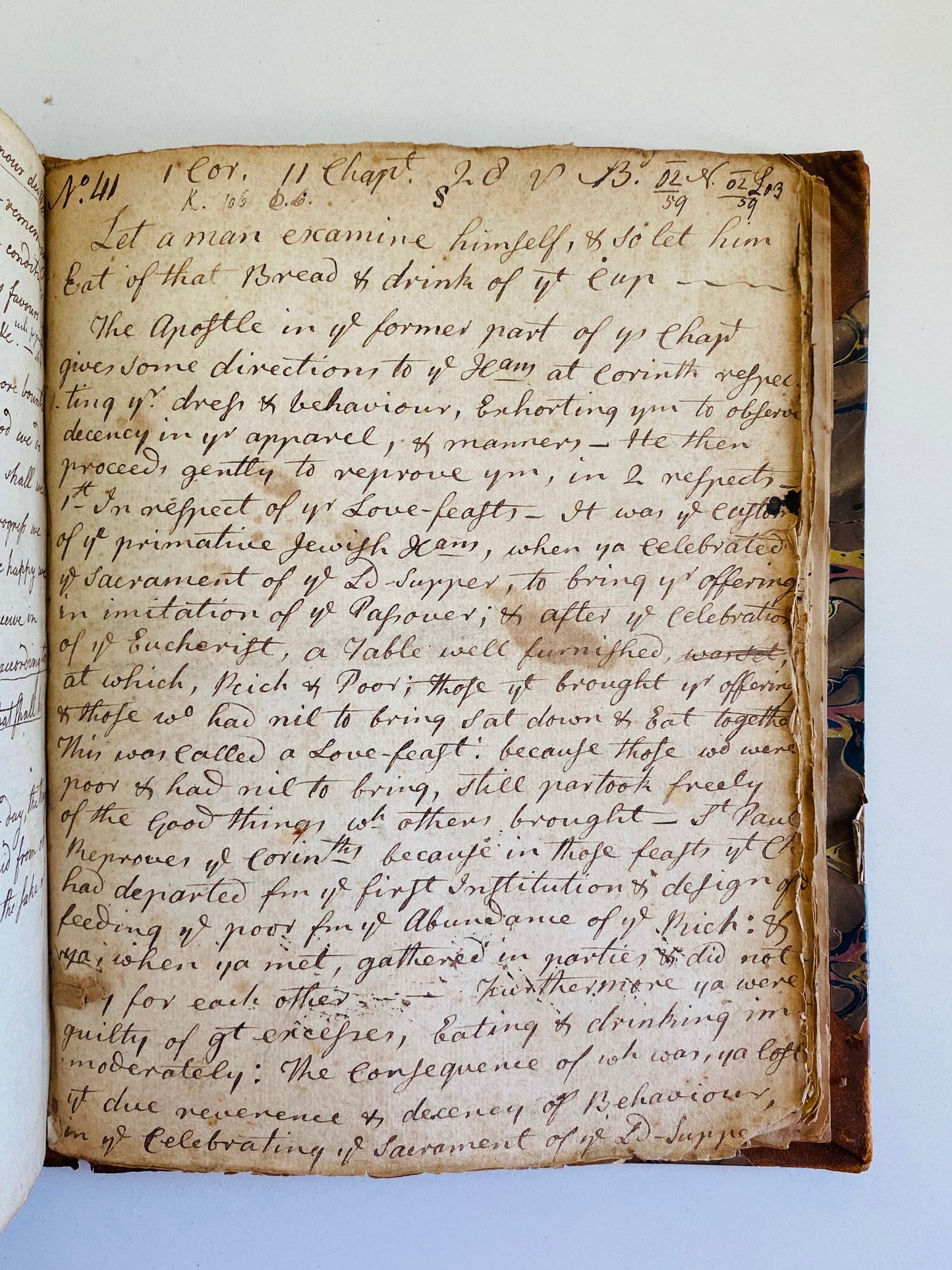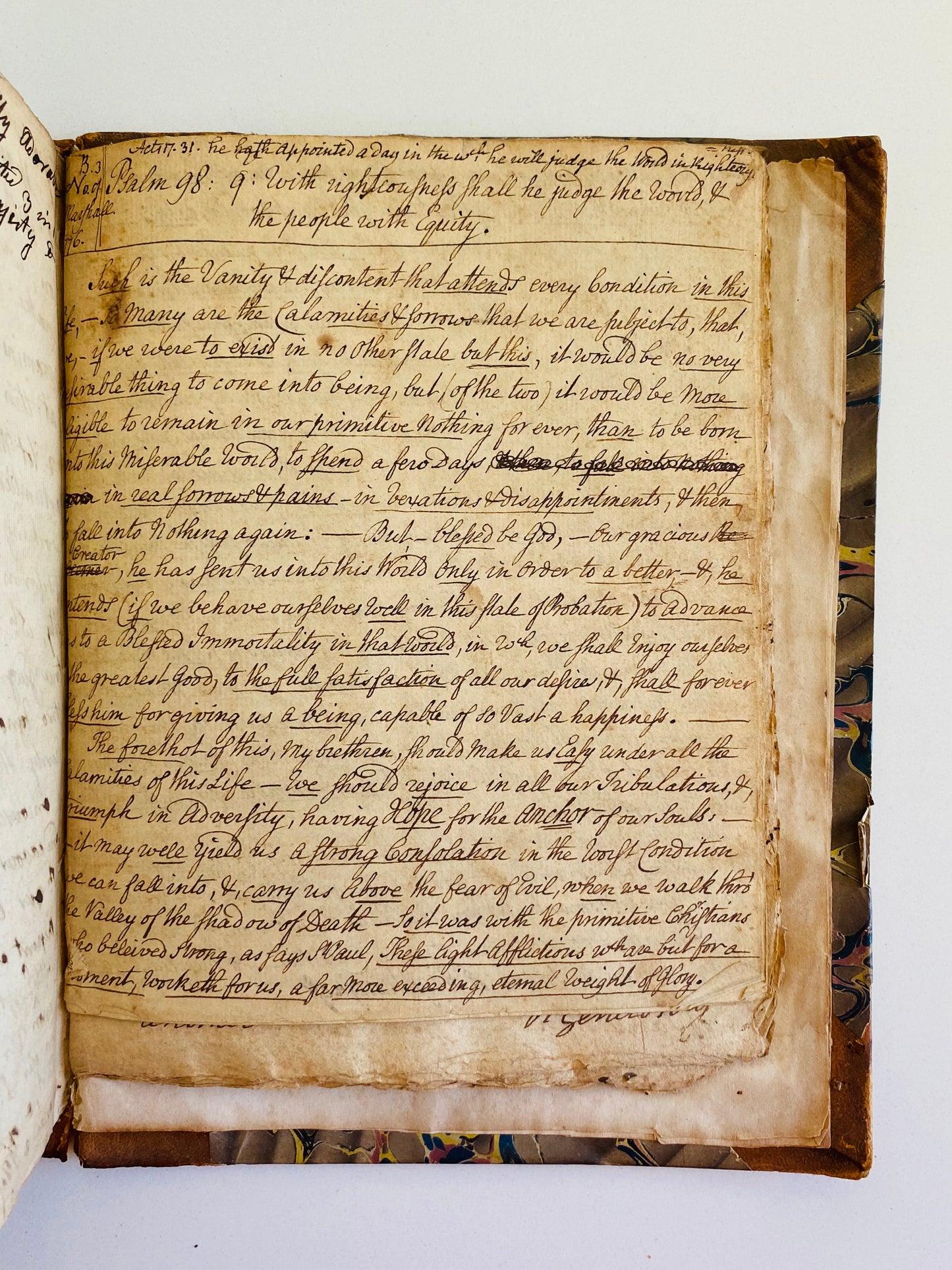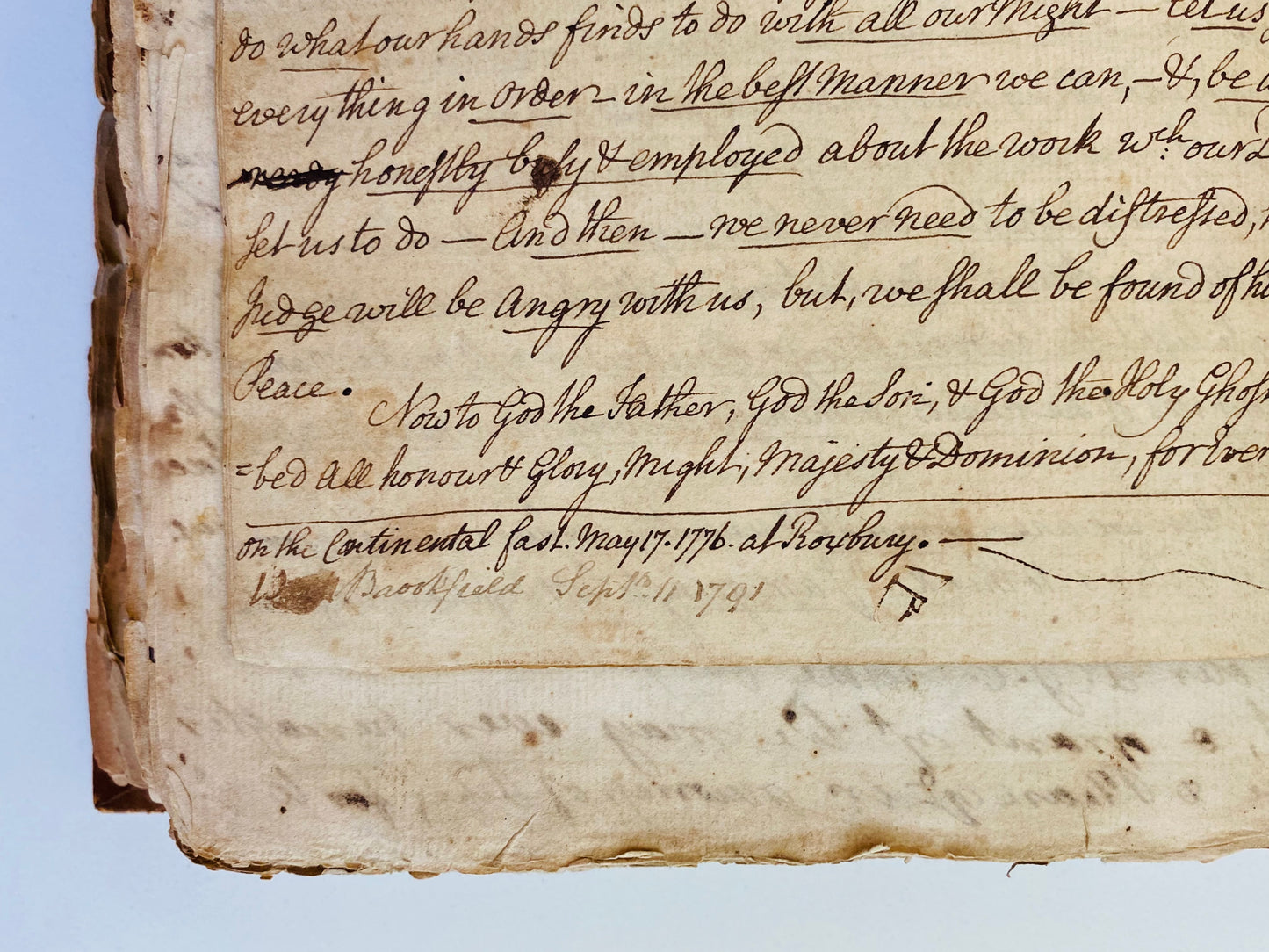Specs Fine Books
1776 MANUSCRIPT SERMONS. 25 Unpublished Sermons on American Revolution, Anglican Persecution, French & Indian War &c.
1776 MANUSCRIPT SERMONS. 25 Unpublished Sermons on American Revolution, Anglican Persecution, French & Indian War &c.
Couldn't load pickup availability
An exceptional volume of 26 manuscript sermons, each in the hand of their author, collected by prominent Connecticut divine, Daniel Burhans, and exhibited as an important piece of Connecticut history c.1904 by Joseph Hooper.
The volume focuses almost exclusively on Anglican divines on the run up to the American Revolution and the sermons themselves seem to be selected both for their quality and doctrine, but also in several instances, for their articulation of the relationship of the Anglican church the American Revolution.
As noted, the volume was collected by Rev. Daniel Burhans, inscribed in his hand on the fly leaf, "The following M.S.S. are a Memenot of Labors . . . D. Burhans Property."
An early typed brief description of the document notates the volume as apparently on loan to an exhibition, "A collection of manuscript sermons made by Rev. Daniel Burhans: containing sermons by himself, the Rev. Gideon Bostwick, the Rev. Philo Perry, the Rev. John Beach (1736-1784) the Rev Edward Blakesley. Open at a sermon by Rev John Mayhall [sic., Marshall], in whose study - - - - - - - [Samuel Seabury] was designated as Bishop of Connecticut. Loaned by Rev. Joseph Hooper.
Also includes another vintage description sheet, apparently from the same exhibition, "Vol. manuscript sermons by Conn. clergymen and others. John Mayhall, John Beach, Philo Perry, Gideon Bostwick, Edward Blakesley, Daniel Burhans. Loaned by Revd Joseph Hooper."
Rev. Joseph Hooper, into whose hands this volume passed in the late 19th century, was a prominent divine in Connecticut and a well-known historian. At the 1902 Convocation of the Connecticut Diocese, Hooper was appointed to organize and publish the Records of Convocation from 1790-1848. Presumably, the publication of the records was accompanied by an exhibit, of which the present volume formed a part as it contains manuscript, unpublished sermons from many of the most prominent Anglican divines from the Colonial, Revolutionary, and early American eras.
1. Sermon entitled, "A Discourse for Thanksgiving on Ye Glorious Establishment of a Peace. Preached September ye 4th, at Trenton Congregn."
It is then labeled in Burhans' hand, "The following sermon was given me by the Rev. Mr. Haskill, late of Rye, in 1814. The sermon is excellent. I know that the able Author is long since gone to his God. O that I may meet him in peace. D. Burhans. Plymouth. Decr 11, 1833."
[Samuel Haskell was minister at Rye in New York. The work of the Anglican church there epitomized the difficulty of the Anglican clergy; the town was divided during the American Revolution. The then rector, Rev. Ephraim Avery (apparently for being suspected of having Tory sympathies) was found not far from the church with his throat cut in 1776. The church building was later burned to the ground. In 1795, the congregation was reorganized with Rev. Samuel Haskell as rector from 1797-1801, and then again from 1809-1823. Under the Rev. Haskell, the Rye parish flourished and a new church building was constructed after the Revolution.]
This is an important sermon preached to celebrate the end of the French and Indian War and appears to have been preached at St. Michael's in Trenton, New Jersey by the Rev. Augur [Agur] Treadwell, who was missionary of the Society for the Propagation of the Gospel in Trenton and Pastor at St. Michael's from 1762-1765. He was, however, born in Connecticut, the son of a prominent military man, Lieutenant Hezekiah Treadwell. He served as a lay reader in Long Island [where perhaps he met Haskell] and was from there sent to England for ordination and returned to take the vacant mission at Trenton in 1762. He contracted illness in 1765 and passed away at only 31 years of age. It remains unpublished.
Extracts:
"A Prayer before Sermon -
O Almighty & all bounteous God - Universal Sovereign Spirit, who art ye Light & ye Life of the World - who hast been a strong Tower of Defence to thy Servants against ye violent Assaults of their Enemies - who hast been their Shield & Salvation in ye Days of Danger & Distress & who hast showered so many Blessings upon us, in ye surprizing successes in ye late bloody war.
In humble gratitude we prostrate ourselves in they all Merciful Presence - justly indeed for our manifold sins, might we have been given up for prey unto their Rage - but thou Lord art gracious - slow to Anger & plenteous in Mercy - For thou hast not dealt with us after our Sins, nor rewarded us according to our Iniquities - Accept merciful God of the weak Endeavors of they servants to express their Gratitude & Praises for all thy Goodness & loving Kindness towards us - may we never forget yt thou art God - but always remember that it is thro thee we live, we move, & have our Being, & to thee be ascribed ye Glory of all our Undertakings.
Almighty Deliverer, who hast wrought such wonders for us, who hast stretched out thine Almighty Arm, & rescued us from the fate of War, & now above all to these hast added ye divine Gift of Peace - proceed O proceed! in thy mercies, till our Land is in every Part quiet & secure - & ever horrid Phantom of War finally disappear - Protect & prosper those who are yet to unsheathe ye Sword a barberous [sic.] Enemy, & do thou Eternal Ruler of ye Hearts of Men, change those savage Hearts & subject them to ye Gospel of Peace. . . ."
He then proceeds to preach on Romans 12, "I beseech you ergo Brethren, by the Mercies of God, yt ye present your Bodies, etc." [Translation apparently his own]
He proceeds to preach on the goodness of God as applied to the present military victory and established peace:
"And now more particularly, let me beseech you to act by those mercies which we this Day celebrate, it being ye first Opportunity indulged me to joine with you fully in offering up our Praises and Thanksgivings to Almighty God for his manifold Mercies, particularly in ye establishment of a happy & glorious peace. . .
I shall ergo take a slight survey, & exhibit a few Structures of ye late wonderful Exertions of God's Providence in our Favor with an intention of making a lasting Impression thereof on our Minds, & of evincing how in a particular manner it demands not only our present Gratitude, but ye entire Conforming of our Lives ot ye Wills & Pleasure of ye All-Bounteous Author.
But what a maze have I got into? Where shall I begin? Such a variety of puzzels ye fancy in its Choice. They crowd in upon ye imagination & overwhelm ye Powers of my Soul - so great, so sudden, so unexpected, so compleat, who is sufficient to describe them, who can place them in a point of View to be perceived but in a thousandth part of their Perfection? They are too big for conception. . .
The Lord Himself hath fought our Battles. He hath covered our Armies with his right hand & trampled our enemies to ye Ground. Success hath exceeded our most ardent wishes, and fear hath been banished from our Hearts - Our bold Invaders have learnt to flee & Destruction hath pursued them close - The all directing Hand of Providence hath rescued us from ye Oppression of our Foes, & drawn down Veangeance upon their Heads. . .
French Tyranny aided by popish Superstition had long been striving to extend their sway over this Northern Part of America. Liberty & Protestantism, here so nobly flourishing, could not but be ye objects of ye execrable Hatred of these two fowl Monsters. They had subtly planned a Scheme, they had privily laid their nets, they had almost encompassed & ensnared us, & were prepared to execute & indeed had well nigh executed their united & long premeditated Rage against us. But what are French Tyranny & Popish Superstition? What are their Designs & Purposes, but ye Arbitrary Rule of a weak & wicked Prince, endeavouring to enslave us, ye Free born subjects of English Liberty - & at once to deprive us of our Rights, our Privileges, our All - And how does this Tyranny come attended? Even with that grisly Figure Popery, while that enslaves ye persons, thus to take absolute Dominion of ye souls of men.
Popery was prepared to make inroads upon us - Popery, ye wicked inchantress, who by her sorceries, her pleasing but destructive delusions, cheats her Votaries into a persuasion of their safety; at the same time that she leaves them in ye gall of bitterness & bonds of iniquity.
I need not mention ye racks & torments that were prepared for us, in order to subject to their Tyranny & Oppression. Cruel & dreadful scenes almost beyond Conception must have taken Place in ye Land of Freedom & true Christianity had not our Enemies been blasted by ye intervening Providence of God in their impious Designs. What a scene of cruelty has appeared on our Frontiers. See ye Crimson Fields soaking with ye blood of gallant British Heroes & ye Blaze of Ruined Habitations discovering such scenes of horrid Barbarity as all ye Records of History can equal.
Flushed with success & drenched with slaughter, our Foes penetrated almost into ye very Heart of our Country. Amazement sits in every eye, despair & terror seizes on every Brest. Misery and utter Desolation seems ready to pounce upon us. But Oh! Transporting vicissitude - See whence ye Omnipotent Ruler stretches out his saving Hand & snatched us from Impending Destruction - We are not only rescued from ye devouring jaws of Cruelty - but Victory waving her flaming banner, declares in our Cause. Was not there remarkable Providences attending ye siege & surrender of Louisbourg - And did not God manifest himself in our Favor against Frontenac & ye consequent Successes of ye Expedition in ye same year against Fort DuQuesne, now & forever to be remembered by ye honourable name of Pitsbourgh. And who will dare to say that God did not manifest himself for us in ye four last glorious campaigns. Campaigns whose transactions will ever shine in Story, whose events must ever be treasured in ye Memories of English Americans & will be transmitted with ye highest Delight in ye Relation from Father to Son, even to ye latest Generations."
Etc. etc. This is indicative of much of the sermon, especially the latter half. 44pp. Last 3 leaves not bound in, apparently lacking a final leaf.
This is just the first sermon!
2. Sermon entitled, "Epiphany; Or, the Light of the Gospel." Preached at Newtown, Second Sunday of Epiphany, 1823. Probably be Daniel Burhans. 20pp + Burhans holograph of a letter received in reply for the present sermon to be published. [Probably The Churchman's Magazine, in which other of his sermons were published as well].
3. Sermon on Romans 5.8 "God commendeth his Love towards us, in that while we were yet Sinners, Christ died for us." Preached at Newtown and Burlington by Rev. Frederick Van Horne. 28pp. Notated as being preached in 1795, 97, 99, and August of 1800.
4. Sermon on the Nativity for Christmas, Newtown, 1811, by Daniel Burhans. 12pp.
5. Second Sermon on the Nativity, 1811, by Daniel Burhans. 18pp.
6. Sermon entitled, "Christmas Eve at Roxbury." It is a brief four page manuscript, but worth of exploration.
It seems to reference the precarious state of the Anglican church on the heels of the American Revolution and seems to take a jab at George Washington's ostentatious reception when contrasted with that of Christ, ". . . the people went before him & strewed the way with myrtle branches - Mr. Washington, the L[ord] of his country, crossed the bridge on a joyful ******* in Trenton (N.J.) - a triumphant arch of myrtles was ***** by the young gentlemen and the young ladies, strewed in his path, flowered, etc.
Sufficient is it in ye subjects to justify the laudable zeal & feelings of Parishioners that have long labored under a depression & troubles unparalleled - & well may ye as your prospects brighten through your pecuniary [relief?]. . .
He then seems to reprove them though, stating that there has been an overwhelming tempest that has threatened to deluge them, etc.
It is a bit difficulty to decipher, but it seems that some of his parishioners are pro-G.W., and he understands that, but worries that being pro-American might be at conflict with the stability and security of the Anglican church, which had been viewed as a safe house for Toryism.
Inscribed, but I can't make it out.
7. Sermon Preached Christmas Eve 1816 by Daniel Burhans. 16pp.
8. Sermon Preached by Daniel Burhans on the Means of Grace, preached at various locations. 16pp.
9. Sermon Preached "Universal Redemption & Free Grace" on John 3.16. 32pp. By Daniel Burhans.
10. Sermon on the Martyrdom of St. Stephen by Daniel Burhans. 1797. 38pp.
11. Sermon, "Love Fulfills the Law" by Daniel Burhans. 18pp.
12. Sermon on Agrippa's Declaration, "Almost a Christian," [begun on the partial back of a printed Proclamation of Connecticut's Governor, John Treadwell] 26pp. By Daniel Burhans
13. Sermon, "Rest for the People of God," by Daniel Burhans. 18pp.
14. Sermon, "The Halting Christian" by Daniel Burhans. 16pp.
15. Sermon by David Botsford of Newtown, on the Healing of Naaman. 1824. 11pp.
16. Sermon on Ephesians 4.3, "Endeavoring to the Keep the Unity of the Spirit" by Philo Perry, 1791. 21pp.
17. Sermon on Romans 8.16, "The Spirit itself beareth witness with our Spirit, that we are the Children of God." 15pp. 1796.
18. Sermon on Acts 20.21, "Testifying both to ye Jews, & also to ye Greeks, repentance toward God & faith towards our Lord Jesus Christ." Unnamed, but dated 1792. Not consistent with the handwriting of any other author in the volume.
19. Sermon on Galatians 6.7, "Be not deceived, God is not mocked; for whatsoever a man soweth, that shall he also reap." Preached Newtown and Brookfield, 1792. 22pp
20. Sermon on I Corinthians 11.28, "Let a man examine himself, etc." by Gideon Bostwick. 20pp. 1783.
21. Sermon on Philippians 1.6, 7. "Being confident of ys very thing, yt he who hath begun a good work, etc." Gideon Bostwick. 16pp. 1782.
22. A partial manuscript, but superb content, ". . . disgrace the annals of our American Revolution & a Narat. of Robert [?] Sphere [?], blot from the page of the rights of men the endearing name of liberty. If so you let the Metaphysical Dr [?], the absurdities of enthusiasts, of the irregular lives of professional Xians, overturn the whole system of Xty. If false patriots, if designing men destroy civil govt then on the ruins near a throne demented in the blood of freeman for some naughty Tyrant to rule them with a rod of iron, &c. It seems likely that this was penned during the Revolution itself and bears further inquiry. 2pp. Similar language was used during the Cromwellian reign to describe "Presbyterian Prelacy." It is possible this refers to the Presbyterian desire to set up a Presbyterian theocracy in the newly minted, "United States." This would be consistent with the Anglican influence of the rest of the volume. It seems likely this is also by Gideon Bostwick and perhaps was inserted into the previous sermon as an aside. Much of the volume present expresses angst over the future status of the Anglican Communion in a post-Revolution America.
23. Sermon Preached at the Annual Convention of the Clergy of Connecticut, May 29, 1782, on I Timothy, 4.16, "Take heed unto thyself, and unto thy Doctrine, continue in them, for in doing this, thou shalt both save thyself, and them that hear thee." 22pp.
A fascinating sermon against "enthusiasts." Baptist revivalism was prominent during the revolution and is probably the target of the message. He says it is a blackness, a drudgery, and it calls people to anxiety, uneasiness about their salvation, and sees God as a tyrant and his people as "Gally Slaves." This is likely with an eye to the incessant hell-fire and brimstone preaching of Baptist, Eleazer Clay, or perhaps the Shakers, who were in reasonable proximity to Connecticut.
24. Sermon Preached by Edward Blakesley on Luke 5, "And he said unto them, Can ye make ye children of ye bride chamber fast. . . " during Lent. 1792. 18pp.
25. Sermon Preached, Yes, You're Reading this Correctly, "On the Continental Fast, May 17, 1776, at Roxbury.
This sermon was preached on the day after the Continental Congress meeting of May 16, 1776 where a general fast was called for in light of the ensuing declaration of war. Already, soldiers were being enlisted, medical kits prepared, etc., for what was to come just six weeks later.
It was preached by Rev. J. R. Marshall [John Rutgers Marshall]. Marshall had begun his ministry at Woodbury, CT in 1771 and was seen as a leader among the Anglican Clergy during the American Revolution. Many afraid to gather in churches, he gathered a church of Clergy and faithful congregants in his own home. Shortly after the preaching of this message, because of suspected Tory loyalties, he was beaten and left for dead. Afterward, he was pursued by the "Committee for Public Safety," seen by Tory Loyalists as the "Patriot's" S.S. They often publicly humiliated Loyalists, beat them, and at times killed them privately or publicly. Marshall fled in advance, probably have received notice.
Later, he was again making calls in Woodbury and Roxbury, and he was taken and beaten by a mob. Interestingly, he was largely an unpolitical person.
He, along with a small group of Anglican leaders, was responsible for the selecting the first Anglican Bishop ordained in the New World, Samuel Seabury, and firmly setting the Anglican communion in America on a course for religious tolerance across the board with dissenters, etc.,
16pp, complete, preached on Psalm 98.9, "With righteousness shall he judge the world, & the people with equity."
Fascinatingly, he chose to focus the bulk of the message on, what was called for, a national day of humiliation, repentance, and prayer and for the majority of the sermon avoided discussion of the impending war. And when it is alluded to, and indeed throughout the sermon, he seems to already be resigned to the fact that things will not go well for himself and for other Anglican Christians and clergy.
Indeed, the sermon refers to the impending Revolution as a part of the "confusion & disorder" of a sinful, broken world. It is spiritual, as well as political, treason and he seems the Anglican church as ready to be ground under the American Revolution's godless wheel.
"How full of all unrighteousness is this world. How often do the wicked prosper & triumph, & the righteous suffer silence. The world is full of confusion & disorders [& this is the only reason why we are called upon this Day to humble ourselves before a Righteous God] but, for our comfort, we may look to the righteous judgment of God - that day will bring all our conduct to light & set it right; at that day shall the innocent & righteous triumph. Everlasting shame & confusion shall cover the wicked."
The connection of confusion in the passage seems to make his intention clear; the American Revolution is a part of the "confusion" and "disorder" of sin. And God, in the end, will "confuse" those responsible. They are the wicked. Subtle, as is appropriate for a person in his obviously precarious position.
He continues,
"When we are reproached & unjustly confined, what a comfort will it yield us to think, "I am going to God's righteous judgment. He sees all the motions of my heart. He knows my integrity & that I desire nothing but to do his will. He will clear my innocence from men's reproaches."
Marshall is an Anglican through and through. The word "order" is repeated again and again. Negatively, "confusion," "disorder," etc.
He gives his fellow Anglicans important counsel in light of the impending violence they would endure . . . the dye has been cast . . . there is nothing to do now but walk the path with sincerity and godliness . . .
"Let us, with the greatest Earnestness, prepare for the righteous judgment of God. Let us break of our sins by a speedy repentance. Let us be thoro in the practice of our present Duty. Let us love, look, & watch for Christ's coming. Let us be as Earnest and as much engaged for Christ's coming as we suppose we shall be about receiving our Doom when he is come. Let us carefully enquire, what defects & blemishes are in our souls, & let us rectify them. Let us put on the Wedding Garment of humility, etc. Let us do what our hand finds to do with all our might. Let us set everything in order [there is that word again], in the best manner we can, & be always honestly employed about the work which our Lord has set us to do. And then, we never need to be distressed that our Judge will be angry with us, but we shall be found of him in peace."
26. Sermon on Romans 2.7, "To them, who by patient continuance in well doing, seek for glory & honor & immortality, Eternal Life."
Unsigned, but a very similar sermon to the one above, and likely from the Revolutionary War era. The preacher, almost certainly Anglican, describes in great detail the tribulations that are to come from the "malice of men" and calls the present "this dark & gloomy hour" and references our "present vexations & fears."
This final sermon well worth exploration. An exceptional volume of Colonial, American Revolution, French and Indian War, Connecticut, and Anglican Interest.
Half leather, likely Burhans' original binding. Rubbed, leaves turned from the binding of various sermons of slightly different sheet sizes.
Share
